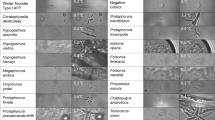Play all audios:

Letter Published: 01 June 1995 Ice-binding structure and mechanism of an antifreeze protein from winter flounder F. Sicheri1 & D. S. C. Yang1,2 Nature volume 375, pages 427–431 (1995)Cite
this article
3118 Accesses
12 Altmetric
Metrics details
AbstractANTIFREEZE proteins provide fish with protection against the freezing effect of polar environments by binding to ice surfaces and inhibiting growth of ice crystals. We present the X-ray
crystal structure at 1.5 Å resolution of a lone α-helical antifreeze protein from winter flounder, which provides a detailed look at its icebinding features. These consist of four repeated
ice-binding motifs, the side chains of which are inherently rigid or restrained by pair-wise side-chain interactions to form a flat binding surface. Elaborate amino- and carboxy-terminal cap
structures are also present, which explain the protein's rich α-helical content in solution. We propose an ice-binding model that accounts for the binding specificity of the antifreeze
protein along the <011¯2> axes of the {202¯1} ice planes1.
Access through your institution Buy or subscribe This is a preview of subscription content, access via your institution
Access options Access through your institution Additional access options: Log in Learn about institutional subscriptions Read our FAQs Contact customer support Similar content being viewed
by others Polyproline type II helical antifreeze proteins are widespread in Collembola and likely originated over 400 million years ago in the Ordovician Period Article Open access 01 June
2023 Characterization of microbial antifreeze protein with intermediate activity suggests that a bound-water network is essential for hyperactivity Article Open access 16 March 2021
Adsorption of ice-binding proteins onto whole ice crystal surfaces does not necessarily confer a high thermal hysteresis activity Article Open access 14 September 2022 References Knight, C.
A., Cheng, C. C. & DeVries, A. L. Biophys. J. 59, 409–418 (1991).
Article CAS Google Scholar
Chakrabartty, A. & Hew, C. L. Eur. J. Biochem. 202, 1057–1063 (1991).
Article CAS Google Scholar
Wen, D. & Laursen, R. A. J. biol. Chem. 267, 14102–14108 (1992).
CAS PubMed Google Scholar
Jorgensen, H. et al. Protein Engng 6, 19–27 (1993).
Article CAS Google Scholar
Ananthanarayanan, V. A. & Hew, C. L. Biochem. biophys. Res. Commun. 74, 685–689 (1977).
Article CAS Google Scholar
Chakrabartty, A., Ananthanarayanan, V. A. & Hew, C. L. J. biol. Chem. 264, 11307–11312 (1989).
CAS PubMed Google Scholar
Richardson, J. S. & Richardson, D. C. Science 240, 1648–1652 (1988).
Article ADS CAS Google Scholar
Presta, L. D. & Rose, G. D. Science 240, 1632–1641 (1988).
Article ADS CAS Google Scholar
Baker, E. N. & Hubbard, R. E. Progr. Biophys. molec. Biol. 44, 97–179 (1984).
Article CAS Google Scholar
Hew, C. L. et al. Eur. J. Biochem. 160, 267–272 (1986).
Article CAS Google Scholar
Piela, L., Nemethy, G. & Scheraga, H. A. Biopolymers 26, 1273–1286 (1987).
Article CAS Google Scholar
McGregor, M. J., Islam, S. A. & Sternberg, M. J. E. J. molec. Biol. 198, 295–310 (1987).
Article CAS Google Scholar
Thanki, N., Thornton, J. M. & Goodfellow, J. M. J. molec. Biol. 202, 637–657 (1988).
Article CAS Google Scholar
Knight, C. A., Driggers, E. & DeVries, A. L. Biophys. J. 64, 252–259 (1993).
Article ADS CAS Google Scholar
Wen, D. & Laursen, R. A. Biophys. J. 63, 1659–1662 (1992).
Article ADS CAS Google Scholar
Lal, M., Clark, A. H., Lips, A., Ruddock, J. N. & White, D. N. J. Faraday Discuss. 95, 299–306 (1993).
Article ADS CAS Google Scholar
Madura, J. D. et al. J. Am. chem. Soc. 116, 417–418 (1994).
Article CAS Google Scholar
Yang, D. S. C., Chung, Y. J., Chen, P., Rose, J. P. & Hew, C. L. J. molec. Biol. 189, 725 (1986).
Article CAS Google Scholar
Brunger, T. A., Kuriyan, J. & Karplus, M. Science 235, 458–460 (1987).
Article ADS CAS Google Scholar
Fitzgerald, P. M. D. J. appl. Crystallogr. 21, 273–278 (1988).
Article CAS Google Scholar
Yang, D. S. C., Sax, M., Chakrabartty, A. & Hew, C. L. Nature 333, 232–237 (1988).
Article ADS CAS Google Scholar
Hew, C. L., Chakrabartty, A. & Yang, D. S. C. Integration and Control of Metabolic Processes: Pure and Applied Aspects (eds Kon, O. L. et al.) 299–309 (ISCU, Cambridge, 1987).
Google Scholar
Jones, T. A., Zou, J. Y., Cowan, S. W. & Kjeldgaard, M. Acta crystallogr. A47, 110–119 (1991).
Article Google Scholar
Download references
Author informationAuthors and Affiliations Department of Biochemistry, Faculty of Health Science, McMaster University, Hamilton, Ontario, L8N 3Z5, Canada
F. Sicheri & D. S. C. Yang
BioCrystallography Laboratory, VA Medical Center, PO Box 12055, Pittsburgh, Pennsylvania, 15240, USA
D. S. C. Yang
AuthorsF. SicheriView author publications You can also search for this author inPubMed Google Scholar
D. S. C. YangView author publications You can also search for this author inPubMed Google Scholar
Rights and permissions Reprints and permissions
About this articleCite this article Sicheri, F., Yang, D. Ice-binding structure and mechanism of an antifreeze protein from winter flounder. Nature 375, 427–431 (1995).
https://doi.org/10.1038/375427a0
Download citation
Received: 16 February 1995
Accepted: 06 April 1995
Issue Date: 01 June 1995
DOI: https://doi.org/10.1038/375427a0
Share this article Anyone you share the following link with will be able to read this content:
Get shareable link Sorry, a shareable link is not currently available for this article.
Copy to clipboard Provided by the Springer Nature SharedIt content-sharing initiative
